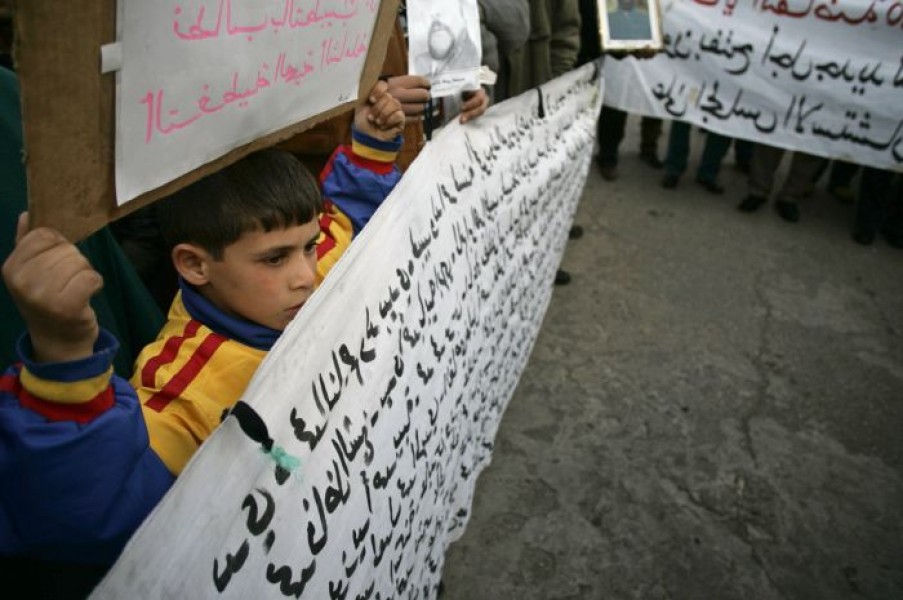Morocco’s history since its independence in 1956 was marked by repression and widespread human rights violations. Since 2003, ICTJ has worked in Morocco with officials and civil society groups to address this legacy of violations through its transitional justice process.
Morocco

Relatives of victims of human rights abuses demonstrate to demand compensation. (Reuters/Rafael Marchante)
Background: A Gradual Process
After Morocco’s independence in 1956, authorities arbitrarily detained, tortured or “disappeared” thousands of citizens over many years. They also responded brutally to public protests and strikes, causing dozens of civilian deaths.
In 1990, in response to growing internal and international criticism, King Hassan II established the Advisory Council on Human Rights (CCDH). Several hundred political opponents were subsequently released.
In 1998 the council recommended that the king establish an official body to compensate victims of past human rights abuses. King Hassan approved the proposal just two weeks before he died in 1999.
King Mohammed VI, King Hassan’s son and successor, appointed the Independent Arbitration Commission (IAC) that same year to compensate victims of arbitrary detention and enforced disappearance.
The Equity and Reconciliation Commission
In response to growing demand from civil society and victims groups—who were unsatisfied with previous measures—King Mohammed created the Equity and Reconciliation Commission (IER) in 2004. The IER’s mandate included establishing the truth about past violations, providing reparations to victims and families; and recommending measures to prevent future violations.
The commission examined more than 22,000 applications for consideration, conducted investigations, and held public hearings throughout Morocco featuring the testimony of victims—an unprecedented event in the region. It presented its final report to the king in December 2005. Shortly thereafter King Mohammed approved publication of the report and asked the CCDH to carry out the commission’s recommendations.
As of 2011, important work remains to be done. Communal reparations programs are still in their initial phase. A number of disappearance cases remain unresolved. The IER’s legal and institutional reform recommendations remain in embryonic form.
ICTJ's Role
ICTJ worked closely with the IER as well as civil society groups and the media throughout the process, providing assistance in areas such as investigating human rights abuses, development protocols for public hearings, designing reparations programs, and development public and media outreach strategies.
ICTJ is currently in the process of assessing the IER experience and assisting Moroccan’s in their efforts to implement its recommendations:
- Truth-seeking: ICTJ monitors the follow-up investigations into the fate of the disappeared, and makes recommendations on how to complete this process in line with international standards.
- Security sector reform: ICTJ and its partners have conducted a series of workshops, capacity building activities and advisory missions with local officials and civil society groups on comparative experiences in this area to facilitate dialogue on how to implement the IER recommendations on security sector reform.
- Fighting impunity: In partnership with the Moroccan Organization for Human Rights and Friedrich Ebert Stiftung, ICTJ has launched a project to support the implementation of the IER recommendation which calls for “the adoption of a national strategy to fight impunity.” This includes mapping areas where impunity is still prevalent and training and advising those advocating for the reinforcement of accountability mechanisms and legislation.
- Memorialization: Together with the International Coalition of Sites of Conscience, ICTJ is currently in the process of analyzing memorialization efforts in Morocco and proposing solutions based on experiences in other relevant countries.
- Learning from Morocco. In partnership with local institutions, ICTJ has initiated a number of projects to study Morocco’s transitional justice experience. It seeks to draw key lessons that can be used in Morocco’s ongoing process and elsewhere. These projects have included a 2009 International Symposium on Collective Reparations experience and an ongoing assessment of the gender dimension of the IER's work.